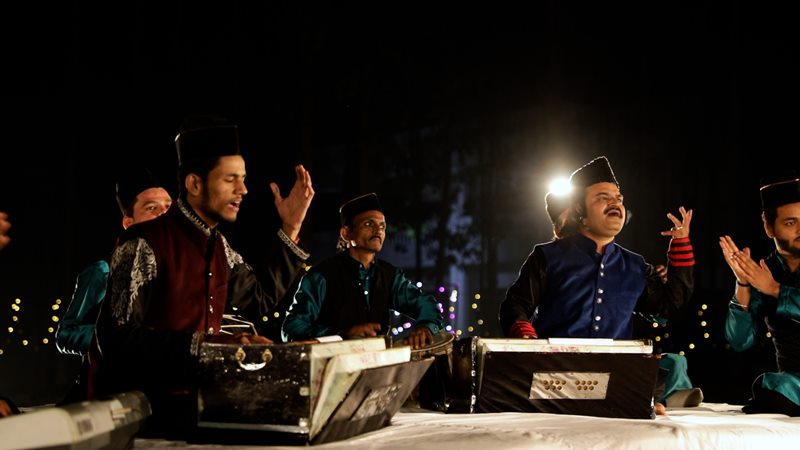A qawwali to quit alcohol
Stories can change lives, teach valuable lessons and of course entertain. And when they are set to music, they can be transforming, as this qawwali written by the famous storyteller Neelesh Misra shows.

Storytelling is arguably the best way to grab the attention of people and get them to listen closely. Stories, jaatras, hari kathas, poetry recitation, puppet shows, plays, qawwalis… have from time immemorial played a pivotal role in conveying a message.
And now, India’s famous storyteller, Neelesh Misra, has written a qawwali – Daaru Pe Qawwali – and used this genre of music dating back to the thirteenth century and perhaps even earlier to raise awareness about the ills of alcohol addiction.
Qawwali uses rhythm and repetition to engage with its listeners. There have been an infinite number of qawwalis, well beloved of Bollywood aficionados. The foot-tapping, vigorous, high-energy singing has always struck a chord with fans.
In Daaru Pe Qawwali two parties of singers debate the merits and demerits of drinking alcohol. While one team says bring on the booze or daaru, the other side opposes it. One side praises alcohol, the other rebuts with how it can wreak havoc in life.
Also Read: Alcoholism can be conquered and here’s ‘how’ Bhushan did it
“What is the big deal? Booze lightens the spirit, sets the tone for a good time, and it is perfect medicine for a broken heart,” sing those in favour, while those from the opposing team list out the evils of drinking. “It wipes out a lifetime of savings, it causes frightening diseases, it ruins families…,” they clap and sing.
Qawwal singers Ghulam Waris, Ahad Chisti, Aman Chisti, Rashid Ahmed, Shaheer Warsi, Said Warsi, Izam Warsi and Guddu, robustly render the Daaru Pe Qawwali. They are qawwals who perform regularly at the shrine of the pir Haji Waris Ali Shah from Dewa Sharif in Barabanki, Uttar Pradesh.

Drinking for entertainment is no entertainment, it is slow poison, it robs you of your humanity, of your senses… it can kill you… is the message that comes through as the qawwals debate the matter, musically.
This qawwali written by Misra, founder of Gaon Connection, India’s largest rural media platform, is part of the collaboration with the World Health Organization South-East Asia (WHO SEARO) for a social campaign called Meri Pyaari Zindagi. The campaign uses a series of audio and video stories to raise awareness on alcoholism and its terrible impact on both physical and mental health.
According to WHO, in 2016, the harmful use of alcohol resulted in some three million deaths (5.3 per cent of all deaths) worldwide. Of the deaths attributable to alcohol consumption worldwide in 2016, 28.7 per cent were due to injuries, 21.3 per cent due to digestive diseases, 19 per cent due to cardiovascular diseases, 12.9 per cent due to infectious diseases and 12.6 per cent due to cancers.
“Promoting alcohol through memes, stand ups, songs, etc. on mass media platforms is rampant. We wanted to fight the battle on the same pitch,” said Misra. “Why can’t we use the same platform of mass entertainment to convey a message against alcohol abuse,” he asked.
Meri Pyaari Zindagi campaign against alcohol abuse has used slam poetry, spoofs, audio and video stories and now qawwali to bring home the message.
“We will continue to use similar formats to bring home the message. Even if we can make a small dent by using these innovative formats, we would have achieved some of our objectives. We will continue to create new ways of conveying the same message. And, we will keep it entertaining and not preachy,” Misra promised.
In a telling report by WHO, titled Global status report on alcohol and health 2018, alcohol per capita consumption increased in the WHO Western Pacific and South-East Asia regions. These regions include the highly populated countries of China and India. In China, the per capita consumption of alcohol has risen from 4.1 litres in 2005 to 7.2 litres in 2016. In India, the per capita consumption of liquor has gone from 2.4 litres in 2005 to 5.7 litres in 2016.
Meanwhile, the World Health Organization, India, has predicted that by 2030, India would have suffered an economic loss of USD 1.03 trillion due to mental health conditions. A lot of mental health issues are linked to alcohol abuse. And, according to the National Mental Health Survey, nearly 150 million Indians need mental health care services but less than 30 million are actually seeking care.
Also Read: Sometimes the only right answer is NO
Daru Pe Qawwali
आइए सुनाएँ ज़रा दारू पे क़व्वाली
बैठे हैं तो बोतल ज़रा कर डालें ख़ाली
आइए सुनाएँ ज़रा दारू पे क़व्वाली
ज़्यादा ना चढ़ाओ इसे, चीज़ है बवाली
जाने कितनों की इसने जान है ले डाली
आइए सुनाएँ ज़रा दारू पे क़व्वाली
प्यास वालों के लिए थोड़ा नियामत है ये
थोड़ी जो पी ली तो भई कौन क़यामत है ये
दिल जो टूटा तो तेरे ग़म की खुशामद है ये
लेडीज़ों के लिए आज़ादी की आमद है ये
अमाँ तुम अहमकों सी बातें काहे करते हो?
पढ़े लिक्खों के मुँह से कैसी जहालत है ये
कैन्सर हार्ट अटैक से क्या तुम ना डरते हो?
कितनी बीमारी लाए, कितनी मुसीबत है ये
ये उड़ा दे सारी कमाई वो आफ़त है ये
ज़मीं पे ला दे सबको ज़हरीली आदत है ये
ये कोई शौक़ नहीं है रे, बुरी लत है ये
और तो और, तुमको कोई ना बतलाएगा
तेरी मर्दानगी ले लेगी वो शामत है ये
लाखों पीनेवालों की इसने जान है ले डाली
आइए सुनाएँ ज़रा दारू पे क़व्वाली
आइए सुनाएँ ज़रा दारू पे क़व्वाली
बैठे हैं तो बोतल ज़रा कर डालें ख़ाली
आइए सुनाएँ ज़रा दारू पे क़व्वाली
ज़्यादा ना चढ़ाओ इसे, चीज़ है बवाली
जाने कितनों की इसने जान है ले डाली
आइए सुनाएँ ज़रा दारू पे क़व्वाली

